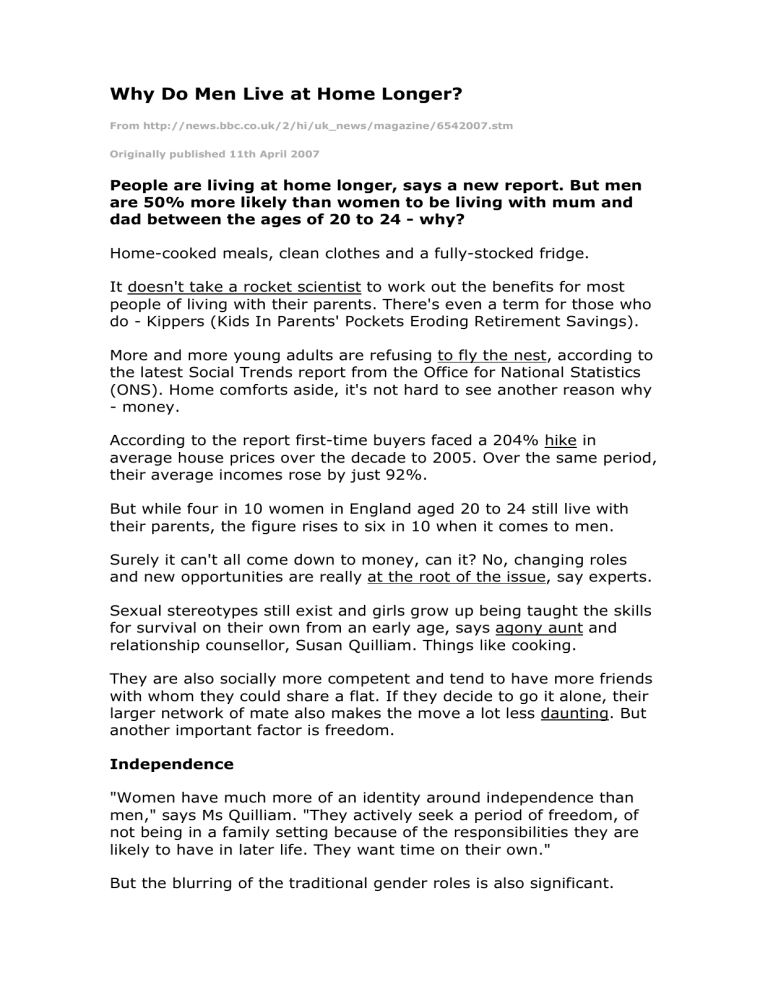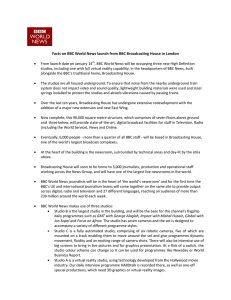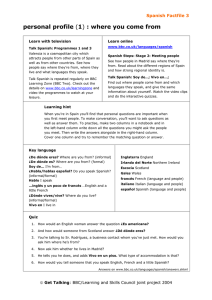
Why Do Men Live at Home Longer? From http://news.bbc.co.uk/2/hi/uk_news/magazine/6542007.stm Originally published 11th April 2007 People are living at home longer, says a new report. But men are 50% more likely than women to be living with mum and dad between the ages of 20 to 24 - why? Home-cooked meals, clean clothes and a fully-stocked fridge. It doesn't take a rocket scientist to work out the benefits for most people of living with their parents. There's even a term for those who do - Kippers (Kids In Parents' Pockets Eroding Retirement Savings). More and more young adults are refusing to fly the nest, according to the latest Social Trends report from the Office for National Statistics (ONS). Home comforts aside, it's not hard to see another reason why - money. According to the report first-time buyers faced a 204% hike in average house prices over the decade to 2005. Over the same period, their average incomes rose by just 92%. But while four in 10 women in England aged 20 to 24 still live with their parents, the figure rises to six in 10 when it comes to men. Surely it can't all come down to money, can it? No, changing roles and new opportunities are really at the root of the issue, say experts. Sexual stereotypes still exist and girls grow up being taught the skills for survival on their own from an early age, says agony aunt and relationship counsellor, Susan Quilliam. Things like cooking. They are also socially more competent and tend to have more friends with whom they could share a flat. If they decide to go it alone, their larger network of mate also makes the move a lot less daunting. But another important factor is freedom. Independence "Women have much more of an identity around independence than men," says Ms Quilliam. "They actively seek a period of freedom, of not being in a family setting because of the responsibilities they are likely to have in later life. They want time on their own." But the blurring of the traditional gender roles is also significant. "Young adults have to learn the rules of the game, how to negotiate relationships and build their own worlds," says Frank Furedi, a sociologist and author of Paranoid Parenting. "Those rules used to be fairly straightforward but have become confused. This lack of clarity has had a greater impact on young men, they are more disorientated by the changes. The issue used to be about the independent young man going out and conquering the world, but that has now taken a bit of a battering. That the experience of living at home can differ for men and women also plays a part. Young men get looked after while young women are often roped into helping look after the rest of the family, says clinical psychologist Dorothy Rowe. Stigma The trend of women leaving home at a younger age is nothing new, says Gill Jones, author of Leaving Home. But years ago, it was to get married and nowadays it is more likely to be about continuing their education. She says class also has something to do with it, with working-class men most likely to leave home the latest. WHAT, WHY? "The people who leave home last are, and WHO, A regular feature in the BBC News have always been, working-class men," she Magazine - aiming to answer some of the questions behind the headlines says. "In the past people would leave the parental home and go into the marital home. "That persists today more among young men of a working-class background. They go from being cared for by their mothers to being cared for by their wives." But while men who still live at home do get a bad press, experts say the financial aspect of the situation means there is not so much of a stigma nowadays. Young men no longer face being ridiculed as "mummy's boys" - well, not so much. Vocabulary: Look at the underlined words and phrases in the text. Can you match them to the definitions? 1. 2. 3. 4. 5. 6. Intimidating To have to do something even though you don’t want to To become established / successful To learn how things are done in a specific setting or environment Spoiled A person who replies to reader’s letters, generally about problems that the readers have. 7. A sharp increase (normally financial) 8. To be criticised / to have a bad reputation 9. It is very easy / obvious 10.To leave home 11.The primary / original cause Try to fit the phrases into the following sentences: 1. Windows 8 ____________________ but I actually prefer it to 10. 2. The first few weeks of my job were tough because I was __________________. 3. These days it seems like people don’t _____________ until they’re thirty! I was out at age 18! 4. Sorry, I can’t come out tonight. I’ve been ________________ looking after my little brother. 5. I’m reading the letters to the _______________ in the newspaper. Some are really strange! 6. He doesn’t even know how the microwave works! He’s such a _______________. 7. It seems like whatever political issue there is, money is almost always _____________. 8. When I was younger I wanted to _______________. These days I’d settle for a modest house and a happy family. 9. The recession has led to a ______ in rent prices. 10.A job interview can be a very _______ situation. 11. You hardly ever came to class and you never studied at home. ___________________ to understand why you failed the exam! Discussion: 1. This article was written in 2007 about the UK. How does it compare to the current situation in your country? 2. Do you believe that there are advantages to leaving home when you are younger? How about leaving home when you are older? 3. The article talks about a gender divide in terms of the expectations of men and women. Do you believe there is a similar divide in your country? 4. If you had to choose, what would you say the ideal age is to leave home in your country / city?








